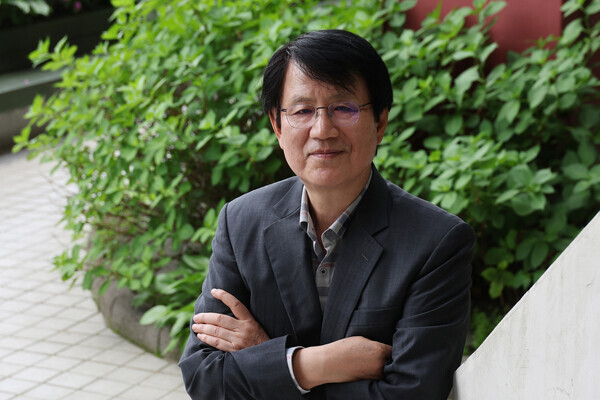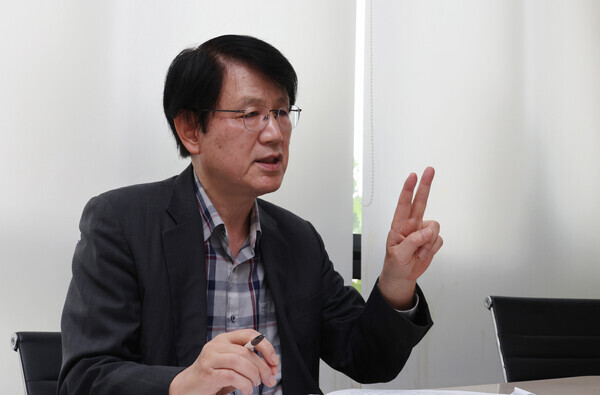Posted on : 2024-05-06
The Hankyoreh sat down with the author of “The Tortuous Path of South Korean Economic Development” to discuss the challenges Korea faces today

Lee Jay-min, a professor emeritus of economics at Yonsei University who was awarded the 14th Hakhyeon Prize for Scholarship, stands for a photo while visiting the Hankyoreh’s offices in Seoul’s Mapo District on April 29, 2024. (Shin So-young/The Hankyoreh)
“The reason for Joseon’s failure at the end of the 19th century was because of its ‘frog in the well’ ignorance of geopolitics, the weakness of its state capacity in military terms, and the severity of internal division. While Korea today is doing better in terms of geopolitical understanding and military strength, our political system is still failing to achieve internal cohesion,” said Lee Jay-min, a professor emeritus of economics at Yonsei University who was awarded the 14th Hakhyeon Prize for Scholarship.
Lee, 74, made the comments during an interview with the Hankyoreh Economy and Society Research Institute in the Gongdeok neighborhood of Seoul’s Mapo District on Monday.
“Korea today faces a tectonic shift in international relations as the two powers of the US and China vie for hegemony. Historically speaking, this can be compared to the transition from the Yuan to Ming dynasties and the founding of Joseon in the 14th century, the transition from the Ming to Qing dynasties and the Qing invasion of Korea in the 17th century, and the imperial aggression of the 19th century. There are lessons we need to learn from our failures in the second and third cases,” Lee said.
In Lee’s prizewinning book “The Tortuous Path of South Korean Economic Development,” which was published in English, he analyzes and assesses the transformation and development of the Korean economy from a traditional society until its current state.
“Economic development cannot be understood through economic analysis alone, and an interdisciplinary approach involving other fields, including history, politics and sociology, is of great importance. I attempted to explain the process of economic development in connection with political and historical changes, but that was too difficult to do properly,” Lee said with some regret.
In their commentary on why Lee’s book was selected for the prize, the judges said its biggest strength was its explanation of Korea’s economic development in the framework of global academic discourse about long-term economic development.
One of the major research topics related to long-term economic development is the growing disparity between Europe and Asia in the modern era. That disparity has been described by Kenneth Pomeranz, a professor at the University of Chicago and a leading authority on Chinese history, as “the great divergence.”
Lee countered by introducing the concept of “the great convergence,” focusing on the economic resurgence seen in countries in East Asia, including Korea and China, since the 20th century.
“Of the many countries that were subjugated during the period of European colonization, Korea is the only one that has managed to become a developed country, and China should also be regarded as being part of the ‘great convergence.’ Overturning centuries of continuous domination by the West is of great significance, and that’s the context in which I sought to examine Korea’s economic development,” Lee said when asked about his reason for writing the book.

Lee Jay-min, a professor emeritus of economics at Yonsei University. (Shin So-young/The Hankyoreh)
Considering that Joseon was unable to join the initial program of industrialization and fell under the colonial yoke, how was Korea able to achieve rapid growth starting in the 1960s? In addition to the industrial experience and infrastructure left behind by the Japanese colonizers, Lee also noted that the economic system in place in Korea was different from that of most newly independent countries as the Cold War matured in the 1950s.
The majority of those new countries failed to develop economically because of their pursuit of socialism or third-world nationalism, but Korea followed the path of capitalism. That was the situation when Park Chung-hee came to power and paved the way for rapid growth by strengthening state capacity, which in turn made his policies more effective.
But Lee cautioned that “a balanced view is needed” because that growth had a “dark side, including Japan’s colonial rule, division and war on the peninsula and Park Chung-hee’s authoritarian rule.”
Initiating rapid growth was hard enough, so how was Korea able to sustain it despite a series of crises? Lee explained that success in three respects — macroeconomic management, structural transformation and management of social conflict — was crucial.
As an example of macroeconomic management, Lee cited the example of Korea’s navigation of a serious crisis that unfolded in 1979. That was when Korea confronted spiking energy prices and Park’s assassination, in addition to unstable prices and foreign debt, chronic issues that had persisted since the 1960s.
“The crisis of 1979 was much more serious than the Asian financial crisis of 1997, but it was handily dealt with by President Chun Doo-hwan. Prices were stabilized by consistent measures by economic experts, and the foreign debt crisis was resolved by a US$4 billion loan from Japan,” Lee said.
“When Japan resisted the idea of making the loan, Korea complained to the Reagan administration in the US that Korea was covering much of the defense load on the front lines of the Cold War while Japan was getting a free ride. That persuaded the US to put pressure on Japan.”
Lee attributed the Asian financial crisis of 1997 to Korea’s failure to respond adequately to changes in the international situation as it had done in the crisis of 1979.
“The foreign exchange crisis occurred because Japanese banks abruptly called short-term loans from Korean banks because of their own internal circumstances. After the crisis, Japan proposed setting up an ‘Asian monetary fund’ to assist Korea and other East Asian countries affected by the crisis, but that idea was resolutely opposed by the US,” Lee said.
“The US’ opposition was due to the changing nature of American hegemony following the end of the Cold War, when leadership of the US economy moved to the financial sector. That was something Korea failed to properly address,” he said.
When it comes to the economic policies of Korea's current leader, President Yoon Suk-yeol, Lee said Korea “needs tight money policies to deal with price instability while also needing contractionary policies of reducing spending and raising taxes on the fiscal front.”
“It wouldn’t be appropriate to cut taxes in the current situation, and it’s unlikely that doing so would lead to growth,” he pointed out.
Lee graduated from Seoul National University with an undergraduate economics degree before earning his doctorate in economics from Harvard University in the US. He has served as president of the Korea Development Economics Association, as well as vice chairman of the National Economic Advisory Council of the Republic of Korea, advising the Moon Jae-in administration on policy.
By Kwack Jung-soo, senior staff writer at Hankyoreh Economy & Society Research Institute
Please direct questions or comments to [english@hani.co.kr]
No comments:
Post a Comment